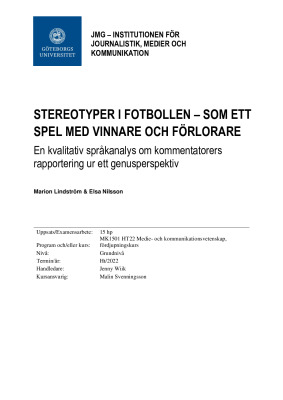STEREOTYPER I FOTBOLLEN – SOM ETT SPEL MED VINNARE OCH FÖRLORARE
En kvalitativ språkanalys om kommentatorers rapportering ur ett genusperspektiv
Executive summary
Football is one of the most popular sports in the world, where many people play, or at least watch the sport. Originally, the sport has been mostly played by men, which has contributed to an unequal football industry. Mainly, the industry is unequal when it comes to gender,
ethnicity, sexuality, etcetera. There are multiple cases where football players have been exposed to racism, homophobia, and gender related discrimination.
During live broadcasting of football games, commentators have a big role and influence on the audience. The commentators participate in the broadcast with a purpose to entertain and inform, sometimes, without considering the actual influence they have over the audience. This includes, expressing any possible stereotypes that they have regarding players. Therefore, this study aims to examine whether commentators are expressing any stereotypes during football
broadcasts. Firstly, we are investigating if men and women are portrayed differently by the commentators. Secondly, if other factors, such as ethnicity, intersect with gender in the commentary. Lastly, the study also examines the representation of men and women as
commentators, to see if the representation is gender equal or not.
The methodology of the study was carried out through inspiration from a qualitative language analysis. This included, watching, transcribing, and analyzing six different football games on an international level, with Swedish commentators. At some points during the examination,
we also use quantitative methods, which helped us analyzing the material in an effective way. While the material was analyzed, we looked for any potential stereotypes and sayings that were related to the purpose and contributing to answering the research questions. These
findings were then presented through highlighting different patterns that had been observed, where a conclusion was drawn.
The results we found through our examination was that football, as of today, is still not gender equal. For instance, there are many more men than women commentating the games, which contributes to men having the most power to influence the audience. There are also overall
many more words given during a football broadcast of man playing compared to women. Furthermore, there are more positive comments during men’s games and more negative comments during women’s games. This contributes to the facts that there is a masculine
standard in football and if women are not as good, fast, and strong as men, they will receive more negative comments. These comments are for instance, “weak”, “bad”, and “slow”. Another interesting fact we could see through our study was that men get more comments about their looks than women do. We believe that the reason for this is that the male commentators are afraid to talk about women’s looks because they are scared to get cancelled. One consequence of this is that men and women are not being treated equally.
Our results shows that it is also not equal when it comes to intersectionality. Earlier studies have shown that black players tend to get more comments about their physical qualities meanwhile white players tend to get more comments about their mental qualities. In our
study, we could see a pattern that this is also occurring in the six games we analyzed. These results show that the commentators are using different attributes depending on which player they are talking about. Reoccurring stereotypes we found in the study was that being
masculine within football is a stereotype. The masculine discourse within football is big and the commentators compare women with men a lot. Furthermore, they also compare players with different ethnicity with each other, perhaps subconsciously. Football is yet not equal, even though it has become more equal during the last decades. However, the commentator’s express stereotypes related to both gender and intersectionality.

